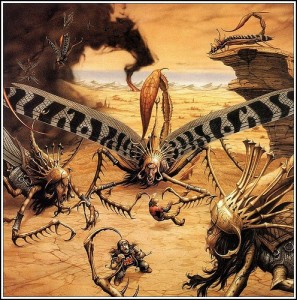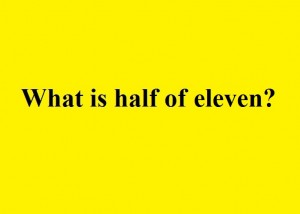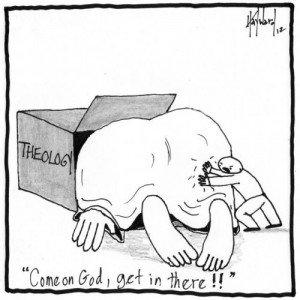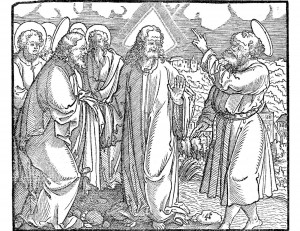From the Book of Ben Sira:
It was he who created humankind in the beginning,
and he left them in the power of their own free choice.
If you choose, you can keep the commandments,
and to act faithfully is a matter of your own choice.
He has placed before you fire and water;
stretch out your hand for whichever you choose.
Before each person are life and death,
and whichever one chooses will be given.
(From the Daily Office Lectionary – Sirach 15:14-17 – October 27, 2012)
 Well, there it is! Bigger than life! Free will! Of course, I know that as an Anglican I am not supposed to use this text, or any part of the Deuterocanon, to settle matters of doctrine, but only read them ” for example of life and instruction of manners.” [Articles of Religion, Article VI, BCP 1979, page 868] But come on! There it is!
Well, there it is! Bigger than life! Free will! Of course, I know that as an Anglican I am not supposed to use this text, or any part of the Deuterocanon, to settle matters of doctrine, but only read them ” for example of life and instruction of manners.” [Articles of Religion, Article VI, BCP 1979, page 868] But come on! There it is!
I probably shouldn’t go there, but the past 48 hours have made it impossible not to think about free will without thinking of Indiana senate candidate Richard Mourdock who stirred up controversy when he said during a debate that “even when life begins in that horrible situation of rape, that is something that God intended to happen.” He tried to explain himself later saying, “God creates life, and that was my point,. God does not want rape, and by no means was I suggesting that he does. Rape is a horrible thing.” He only dug a deeper hole. If it is true that politics and religion don’t mix, it is even more true that politics and the problem of theodicy don’t mix!
“Theodicy” is a little-used word theologians coined to describe what is generally called “the problem of evil.” It posits this rational conundrum:
- God is all-powerful.
- God is all-good.
- God is all-knowing.
- Evil exists.
Only three of these four propositions (says the issue of theodicy) can be true; since we know that evil exists, then one of the other three statements must be false. Many philosophers and theologians have wrestled with this issue and I’m not going to get into it in a brief meditation on the daily office lessons, other than to acknowledge that it exists and that one way it is answered is the very subject Jesus son of Sirach brings up in this reading: free will. In other words, in making the universe (and humankind within it) free, the all-powerful, all-loving, all-knowing God allows the possibility that evil may occur.
St. Thomas Aquinas affirmed in the Summa Theologica that God’s ultimate purpose for creation is so good, so great that it involves “allowing” the possibility of evil, but (as Aquinas points out) to “allow” is not the same as to “cause”. Furthermore, the enduring good that allows evil includes the possibility that good can redeem evil; because of this remaining good, a return path to good is always possible. I think this is the theological concept candidate Mourdock was trying to articulate, but doing so badly and causing himself and his party a good deal of trouble.
I can agree with Mr. Mourdock up to a point, but not about the conclusion he ultimately reaches. In his view, apparently, the return to good, the redemption of the evil of rape, is found in the conception of life which may result. For him, that redemption is (apparently) automatic and, thus, a pregnancy resulting from rape is redemptive; it is a good so great that it cannot be aborted. But neither Aquinas nor any theologian has ever argued that the return to good is automatic; it is always and only contingent – it is possible but never guaranteed. Furthermore, there is the counter possibility in the circumstance of a rape that further evil, not good, could result from the pregnancy and later birth. Indeed, the experience of women who have born the children conceived in rape shows a wide variety of outcomes, many extremely negative, many a continuation of the evil done to them.
That is why I cannot come to the theological conclusion reached by candidate Mourdock, nor to the political conclusion to which he comes, i.e., that abortion should be outlawed with no exception provided for conceptions resulting from rape. Indeed, I cannot come to any conclusion which entirely outlaws abortion. To do so denies to women the freedom of will given humankind from the beginning about which Ben Sira writes; this is a matter about which women should decide for themselves “in the power of their own free choice.” Therefore, abortion should be safe. It can only be safe if it is legal and regulated; if it is outlawed, it will nonetheless continue. The choice for our society is not between abortion and no abortion; it is between abortion which is safe and abortion which is deadly.
I cannot say that I would never, as a priest, counsel a woman to undergo an abortion, but I would nearly always argue for an alternative. In the end, however, it would not be my decision; it would be hers. And if she chooses to abort the fetus, then it is her right to have that procedure done in the safest way possible. Years ago, I participated in a panel discussion with an Eastern Orthodox colleague ordained many years longer than me. During the presentations he said, “I would rather console a woman who’s had a safe, legal abortion, than bury one who’s had an illegal abortion. And I’ve done both.” Unlike my colleague, I have not, thank God, buried the victim of an illegal abortion, and certainly I never want to.
We will always wrestle with the problem of theodicy, but we should do so in the context of theological schools and churches. It is not an issue to be solved in the halls of congress, nor in the operating suites of hospitals, nor in the offices of obstetricians, nor with the bodies of women whom God made free to act as a matter of their own choice.
====================
A request to my readers: I’m trying to build the readership of this blog and I’d very much appreciate your help in doing so. If you find something here that is of value, please share it with others. If you are on Facebook, “like” the posts on your page so others can see them. If you are following me on Twitter, please “retweet” the notices of these meditations. If you have a blog of your own, please include mine in your links (a favor I will gladly reciprocate). Many thanks!
====================
Father Funston is the rector of St. Paul’s Episcopal Church, Medina, Ohio.
 Jesus son of Sirach offered a lot of good advice in his little book sometimes called Liber Eccesiasticus, a book not included in the canon of inspired Scripture recognized by Protestants, but found in that selection of texts called the Apocrypha. Anglicans decline to use these texts to settle matters of doctrine, but read them ” for example of life and instruction of manners.” (Articles of Religion, Article VI, BCP 1979, page 868)
Jesus son of Sirach offered a lot of good advice in his little book sometimes called Liber Eccesiasticus, a book not included in the canon of inspired Scripture recognized by Protestants, but found in that selection of texts called the Apocrypha. Anglicans decline to use these texts to settle matters of doctrine, but read them ” for example of life and instruction of manners.” (Articles of Religion, Article VI, BCP 1979, page 868)
 There are a few folks flying all over the U.S. recently (and promising to do so for the next couple of weeks) who have not followed Ben Sira’s advice! Everyday for the past few weeks my mailbox has contained at least one and more commonly three or more expensively produced, glossy, color flyers extolling the virtues of one or the other of the political parties or candidates, or more often tearing down the other guys. Everyday for the past few weeks my voicemail has recorded a robo-call from some politician or political action group. Everyday at any hour of the day that I care to turn on my television set, I am treated to political advertisements and “news” shows. Someone is not following Ben Sira’s advice to “not seek high office or the seat of honor”! And we as a society are, I’m sad to say, disgraced among the nations by the spectacle of our electioneering.
There are a few folks flying all over the U.S. recently (and promising to do so for the next couple of weeks) who have not followed Ben Sira’s advice! Everyday for the past few weeks my mailbox has contained at least one and more commonly three or more expensively produced, glossy, color flyers extolling the virtues of one or the other of the political parties or candidates, or more often tearing down the other guys. Everyday for the past few weeks my voicemail has recorded a robo-call from some politician or political action group. Everyday at any hour of the day that I care to turn on my television set, I am treated to political advertisements and “news” shows. Someone is not following Ben Sira’s advice to “not seek high office or the seat of honor”! And we as a society are, I’m sad to say, disgraced among the nations by the spectacle of our electioneering. This is from one of today’s psalms for Evening Prayer. What got my attention and caught my imagination is the Psalmist image of unspoken thoughts being painful and bursting into flame demanding to be spoken. While it is intended to be a positive image of trying to not engage with the wicked until one can no longer refrain from doing so, until one’s righteousness is kindled against them, I could not help but be reminded of James’s words:
This is from one of today’s psalms for Evening Prayer. What got my attention and caught my imagination is the Psalmist image of unspoken thoughts being painful and bursting into flame demanding to be spoken. While it is intended to be a positive image of trying to not engage with the wicked until one can no longer refrain from doing so, until one’s righteousness is kindled against them, I could not help but be reminded of James’s words: Jesus is so demanding! Follow me and you won’t have a place rest; leave your dead; if you look back, you aren’t worthy!
Jesus is so demanding! Follow me and you won’t have a place rest; leave your dead; if you look back, you aren’t worthy! 

















 I’ve been thinking about this little bit of Scripture all day! It’s nearly 10:30 p.m. – time for Compline! – and I’m still thinking about seven words from the morning gospel: “Let these words sink into your ears” . . . .
I’ve been thinking about this little bit of Scripture all day! It’s nearly 10:30 p.m. – time for Compline! – and I’m still thinking about seven words from the morning gospel: “Let these words sink into your ears” . . . .  Heart, spirit, body. These two verses speak to me of the necessary investment of one’s whole self, the whole person, into the spiritual and religious life. One of the most influential lay theologians of the middle 20th Century, William Stringfellow wrote: “Spiritual maturity or spiritual fulfillment necessarily involves the whole person – body, mind and soul, place, relationships – in connection with the whole of creation throughout the era of time . . . . Spirituality encompasses the whole person in the totality of existence in the world, not some fragment or scrap or incident of a person.” (The Politics of Spirituality, Westminster John Knox: 1984, p. 22) If Stringfellow is right, and I think he is, then a plan for spiritual growth should follow the Psalmist example and “set the Lord always before” the person seeking to grow. Always . . . not just an hour or so on Sunday morning.
Heart, spirit, body. These two verses speak to me of the necessary investment of one’s whole self, the whole person, into the spiritual and religious life. One of the most influential lay theologians of the middle 20th Century, William Stringfellow wrote: “Spiritual maturity or spiritual fulfillment necessarily involves the whole person – body, mind and soul, place, relationships – in connection with the whole of creation throughout the era of time . . . . Spirituality encompasses the whole person in the totality of existence in the world, not some fragment or scrap or incident of a person.” (The Politics of Spirituality, Westminster John Knox: 1984, p. 22) If Stringfellow is right, and I think he is, then a plan for spiritual growth should follow the Psalmist example and “set the Lord always before” the person seeking to grow. Always . . . not just an hour or so on Sunday morning. “Who do you say that I am?” Better writers and more erudite theologians than I have noted that this is the question at the heart of the gospel, the question that each person must answer for him- or herself. C.S. Lewis addresses it in one of my favorite of his writings, Mere Christianity:
“Who do you say that I am?” Better writers and more erudite theologians than I have noted that this is the question at the heart of the gospel, the question that each person must answer for him- or herself. C.S. Lewis addresses it in one of my favorite of his writings, Mere Christianity:

